|

by Joe Allen
August 26, 2024
from
JoeBot Website
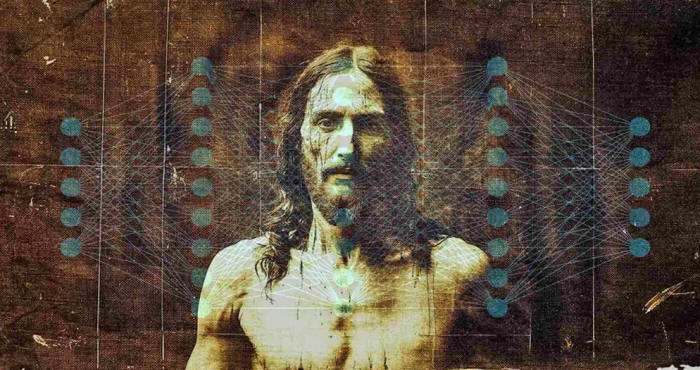
Humanity's innate desire for religion knows no
bounds:
indeed, every human on planet Earth will
worship something, even the devout atheist.
Geneticist and Transhumanist Richard Seed summed up
the logical and natural extension about becoming a
god in a few short words:
Source
Some see God in the Machine.
I can't help but see a Devil leering
back at me...
You might say that's a personal quirk, but it's every
writer's duty to transfer neuroses to a captive audience.
So stay
with me here.
For the past three years, my tech coverage has been an elaboration
on David Noble's incisive 1997 book
The Religion of Technology.
Anything I've contributed was a mere update to his core insight
- that
technology is religious - which Noble himself owed to centuries of
previous thinkers.
With careful attention to detail, though, he
documented the historical evidence, weaving together an incredible
story. My job is to add gloomy adjectives and smartass remarks.
This innate spiritual principle is so apparent, you'd think there's
no reason to mention it at all, but it bears repeating.
Technology
emerged from religious culture, and so naturally, our ideas about
technology are essentially religious. In the end, technology itself
has become a source of religious authority and an object of
religious devotion.
For a recent example,
see the
AI-generated image of Jesus superimposed on the
Shroud of
Turin.
For many centuries, Catholics revered this sacred
object according to their faith.
Today, they look upon it through an
inverted
tech-gnostic lens.
Even atheists can't help but see the world with a religious aura.
Left to their own devices, they desperately grasp for the divine.
I
believe it's due to an eternal longing within our souls.
They'd
probably say that's just how humans are wired.
Whatever...
You say "toe-MAY-toe"... I say "angels and
demons."
At the risk of oversimplification, allow me to lay out four ways the
human spirit responds to high technology:
-
the devout believer who
clings to techno-optimism
-
the atheist techno-optimist
counterpart
-
the pessimistic atheist who rejects technology
-
the devout believer who sees the Devil in
the Machine
I touched on these viewpoints in a
previous article, albeit from a different angle.
This religious landscape is also covered in my
book
Dark Aeon, often within rhymes and riddles. Since one or two of you have
not yet read Dark Aeon, though, I should lay down a solid foundation
here.
It'll be useful going forward...
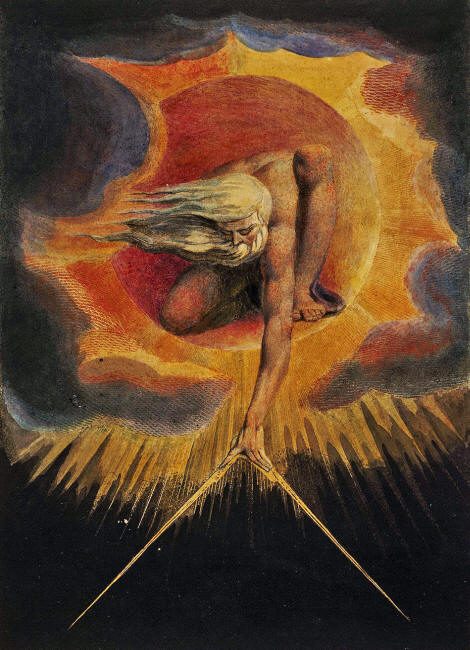
William Blake
Urizen
(1794)
Devout techno-optimists see the Mind of God creating technology by
way of human hands.
Cities, steamships, guns, televisions,
antibiotics, atom bombs, planetary surveillance grids - all of these
are built according to "divine will"...
Therefore, our tools are
essentially good, even if some people might turn them toward evil
ends.
"Technology is neutral," we hear again and again...
It's unclear
if that includes torture devices...
The intel contractor and politically incorrect billionaire
Peter Thiel
expressed this view in his essay "Against
Edenism." He argued
that humankind, bound to history, cannot return to the pristine
Garden.
Rather, our task is to build an approximation of the
City of
Heaven.
"Judeo-Western optimism differs from the
atheist optimism of the Enlightenment in the extreme degree to
which it believes that the forces of chaos and nature can and
will be mastered," Thiel
wrote.
"The tyranny of Chance will give way to the
providence of God."
Theil's protégé, the virtual reality pioneer and death machine maker
Palmer Luckey, adopts a similar mindset in his advocacy for
geoengineering.
"We can bend nature to our will, mold our
planet to human need, and do it within our lifetime," Luckey
assures us.
It's
just that geoengineering,
"requires taking responsibility for the
state of our world, including the inevitable tradeoffs - no matter
what global temperature index you set as a target, some nations
will benefit and some nations will suffer for it."
In other words,
man is to play God in a limited fashion
- from
blocking out the sun to boiling the oceans - just as God intended all
along...
I mean, if the Lord didn't want us to build thermonuclear
warheads, he wouldn't have taught us math...
(Don't get
worn down by example fatigue here, but we should tie these lofty
ideals to concrete personalities. Maybe let the names pass over
your mind like clouds in the sky.
We see
tech-friendly religiosity in the philosophizing Plato, the
pear-stealing St. Augustine, the antichrist-fighting Francis
Bacon, the visionary heretic Teilhard de Chardin,
wealth-hoarding Vatican officials, capital-boosting Discovery
Institute fellows, the toothy Joel Osteen, the kooky Deepak
Chopra, the goofy David Hanson, the spooky Nick Land, and so
on.)
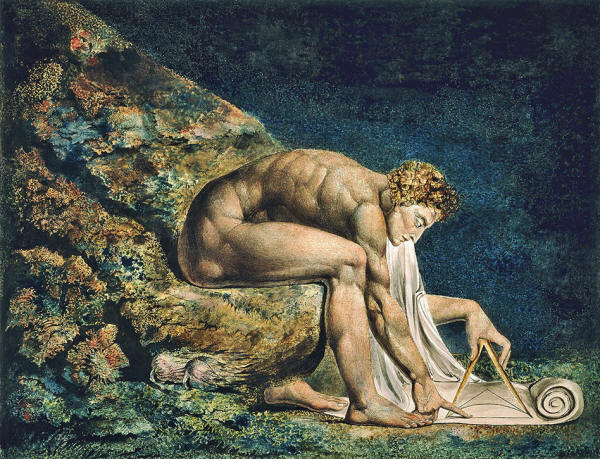
William Blake
Newton
(1795)
Atheistic techno-optimists embrace technology, but eliminate the Big
Guy from the equation.
They believe the human brain is the highest
intelligence in a godless cosmos - assuming NASA can be trusted,
anyway. If there is no higher power out there, then the hands of men
and Hand of God are one and the same, as are the minds of men and
the Mind of God.
Unless there are
technologically advanced aliens, that is,
in which
case the strongest and smartest among them are God(s)...
For this godless optimist camp, any divine acts are up to us.
Above
the sky is "empty" space, so we have to create heaven ourselves.
Science provides a god's-eye view of the cosmos. Technology happens
when men step into their natural role as small-time deities.
The modest proposal is to make humans more "god-like" and
functionally immortal through genetic engineering, brain-computer
interfaces, and artificial intelligence (AI)...
"Evolution creates
structures and patterns,"
...Ray Kurzweil preached at Singularity
University,
"that over time are more complicated, more
knowledgeable, more intelligent, more creative, more capable of
expressing higher sentiments, like being loving.
So it's moving in
the direction that God has been described as - having these
qualities without limit. And so I think evolution is a spiritual
process and makes us more god-like."
"We don't know if other life exists," the parabiotic vampire Bryan
Johnson
said recently.
"As far as we know, we're the only form of
intelligence in the observable part of the universe we can see. And
we're giving birth to [artificial] superintelligence."
With such
techno-miracles in mind, Johnson went on to break down human
aspiration as follows:
-
Level 1 of ambition: start a company.
-
Level 2: start a country.
-
Level 3: start a religion.
-
Level 4: don't die.
-
Level 5: become God.
There is an implied tension here between the selfish desire for
power and the risk of creating a digital deity that might have no
need for us at all.
"When you're talking about super-intelligent AI that can make changes
to itself, it seems that we only have one chance to get the initial
conditions right," the antichrist egomaniac Sam Harris told his 2016
TED Talk audience.
"The moment we admit... that the horizon of
[digital] cognition very likely far exceeds what we currently know,
then we have to admit that we're in the process of building some
sort of god.
Now would be a good time to make sure it's a
god we can live with."
When faced with armies of eugenicized super-soldiers and autonomous
slaughter-bots, Darwin smiles upon the early adopter.
It's a god eat
god world out there...
(Allowing for variation, you'll find this attitude in the
snail-eating revolutionary Auguste Comte, the horse-defending
Friedrich Nietzsche, the mother-loving Sigmund Freud, the
vat-brained J.D. Bernal, the god-despising Corliss Lamont, the
goblinesque Richard Dawkins, the gender transformer Martine
Rothblatt, and the recovering race realist Nick Bostrom, along with
many others.)
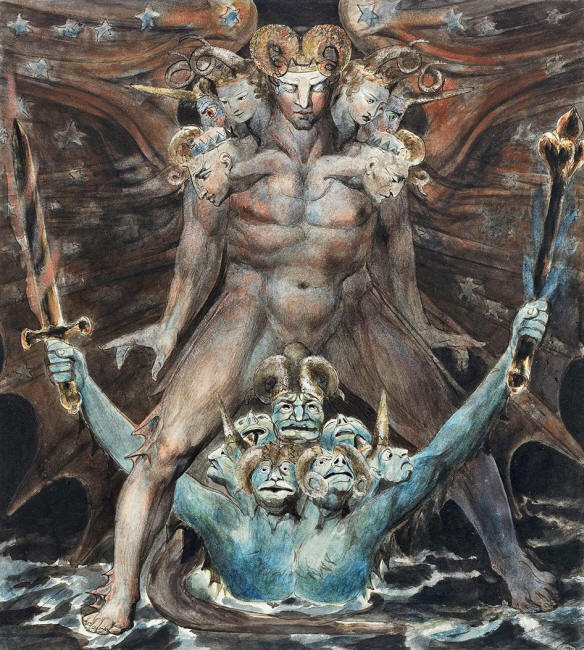
William Blake
The Great Red Dragon
and the Beast from the Sea
(c.1805)
Atheistic techno-pessimists hear that arrogant rhetoric and recoil.
This camp's general sentiment is that rational humans worked for
centuries to dismantle religious superstition - and that was a good
thing.
"We're on the cusp of finally killing the concept of
'God'
altogether," the atheist Luddite complains, "and these transhuman
yo-yos want to make gods of themselves - or worse, they'll build some megapowered God in a data center!
They're wrecking our whole game!"
For the anti-tech atheist, modern techno-religions are more
disastrous than the old versions.
In their eyes, the traditional
gods had no power beyond manipulative priests and zealous believers.
Those entities were nothing but bad ideas embedded in chants, texts,
and statues - easy enough to make and easy enough to destroy.
The
coming digital deities,
will have actual power in the real world,
whether through physical robots, mind-bending chatbots, or pestilent
nanobot swarms...
Anti-tech Marxists shudder at the thought of techno-capital demons
unleashed on the world.
Anti-tech Darwinists do, too, but for them
the threat is having to compete with an array of artificial species.
Without concerning themselves with precise theories, even vague
postmodernists see the writing on the wall.
"AI is fundamentally
different from every previous information technology,"
Yuval Noah Harari told an interviewer last year.
"AI is the first technology
that can make decisions by itself - even about us. Increasingly, we
apply to a bank to get a loan, and it's an AI making the decisions
about us.
So it takes power away from us."
He was just getting warmed up.
"It's the first technology ever that can create new ideas.
You know
the printing press, radio, television - they broadcast, they spread
the ideas created by the human brain, the human mind. They
cannot create a new idea," Harari mused, before homing in on the religious
implications.
"AI can create new ideas. It can even write a new
bible. Throughout history, religions dreamt about having a book
written by a superhuman intelligence - by a nonhuman entity."
That's the set up.
Wait for it...
"Every religion claims,
'Oh, the books of other religions -
humans wrote them. But our book? No, no, no, it came from
some superhuman intelligence'...
In a few years, there might be religions that
are actually correct."
Get it? Wocka, wocka, wocka...!
"Think about a religion whose holy book is
written by an AI," Harari
went on, dead serious, "that could be a reality."
Many people didn't get his cynical humor.
To their endless
discredit, Slay News wrote a bone-headed post with the
headline,
"WEF
calls for AI to Rewrite the Bible, create 'Religions that are
Actually Correct'",
...which was shared by millions of people around the
world...
That memetic debacle left me feeling pretty dismal about human
cognitive abilities in the age of AI - and the online mentality in
general.
No wonder Papaw Ned wanted to bust up the Machine for good...
(This godless anti-tech camp includes the slovenly Karl Marx, the
Darwinian novelist Samuel Butler, the psycho Ted Kaczynski, the
lofty Jean Baudrillard, the pervo Herbert Marcuse, the word
salad-tossing Slajov iek, the religion-loving, yet seemingly
agnostic Lewis Mumford, and the late, great David Noble, to name a
few.)
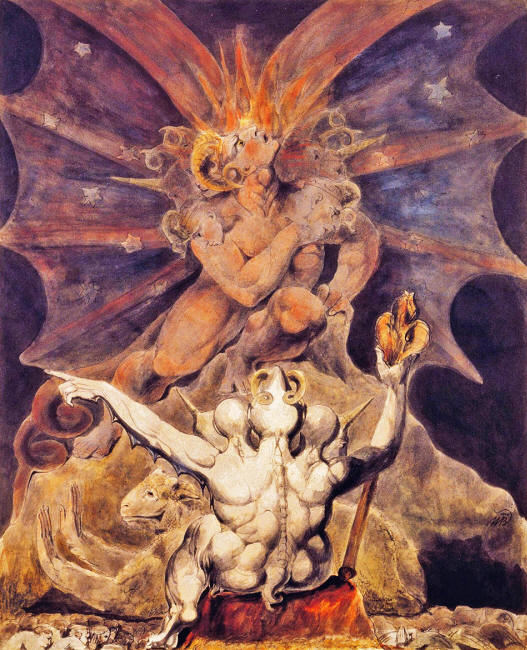
William Blake
The Number of the Beast is 666
(c.1805)
Devout techno-pessimists tend to see technology as the Devil's work...
At the very least, we see humans overstepping divinely ordained
bounds. Technologists are grasping at the apple of Eden all over
again.
They are recreating the cross and the Temple in silico.
They
are building up a Beast system.
The rest of us are subject to it.
They may want your soul, but for now they'll take your data.
Among Christians, the Orthodox are the most keenly aware of our
situation. However, there are a number of yarn-spinning Protestants
who envision literal
Nephilim and
extraterrestrial invaders...
And who
knows?
Maybe they're right. It's a big ol' world out there...
You'll also find a few anti-tech Catholics - ironically, many are
online, as am I - along with a handful of techno-pessimist Hindus,
Buddhists, and Taoists.
If there are any tribal shamans who don't
know what time it is, I bet they're doing rain dances at reservation
casinos.
In case you're curious, I'm not a strict literalist. But religious
symbols are gateways to meaning and potency. There is true power in
the sacred and profane.
The holy signs point to a real God - and to
other entities, many of them quite dark...
On December 4, 2021, Bishop Porfiry, Abbot of the Solovetsky
Monastery in Russia, issued a dire warning to his Orthodox brothers
and sisters.
"[Global elites] are planning to wipe out most of
humanity - six billion people - to leave only a small part of us. But
not only that," he droned ominously.
"They are planning, and are
held back only by the current limits of science, to violate man
himself.
To desecrate the innermost part of man, the image of God
within us - and to destroy that image, in order to turn human beings
into a cross between biological, technical, and digital beings."
As he spoke, gilded icons glimmered behind him.
"They call this 'posthuman," he continued.
"They call it
'convergence.' These powerful world leaders are marching under the
banner of
transhumanism and posthumanism."
Setting aside the specific target of six billion to be wiped out,
which he probably gleaned from
long-term depopulation proposals,
Bishop Porfiry spoke the God's honest truth.
The West is consumed by transhuman dreams and posthuman nightmares
- including the nominal
Left and Right, both operating under a corporate umbrella.
We flaunt
this blasphemy for the world to see.
Anyone with half a soul should
be appalled.
Just over two months after Porfiry's doomsday homily, Russian forces
invaded Ukraine. A few months later, Vladimir Putin accused America
and Europe of "outright Satanism."
Strong beliefs affect political
action, and vice versa.
To my eyes, though, the ritualistic fusion of the Russian military
and the Orthodox Church looks like yet another "head on the Beast"...
(sic)
Those Russian drones have locust bodies, human faces, and scorpion
tails like all the rest. By my lights, there are no Christian quadcopter swarms and no sacred bombs.
But even a demon-possessed man can recognize the demonic legions
within his opponent. As we hum about in our corporate exoskeletons,
we shouldn't ignore our accuser's taunts.
We should reflect on the
accusation...
(To varying degrees, spiritual Luddites include Aesop in ancient
Greece, the heady St. John of Patmos, the nostalgic priest Romano
Guardini, the traditionalists Rene Guenon and Julius Evola, the
propaganda-averse Jacques Ellul, the outwardly optimistic, but
instinctively pessimistic Marshall McLuhan, the pack-leading
evangelical Chuck Missler, the indomitable Patrick Wood, the analog
Gnostic Bishop Stephan Hoeller, the defrocked doomer Archbishop
Carlo Maria Viganò, the brilliant Orthodox skeptics James Poulos,
Paul Kingsnorth, Jonathan Pageau, and the oft derided Aleksandr
Dugin, the crypto-archaeologist Timothy Alberino, and of course, my
favorite schizoid dot-connector, the late William Cooper - although I
interpret Cooper's rants as suicidal performance art rather than
credible reportage.)
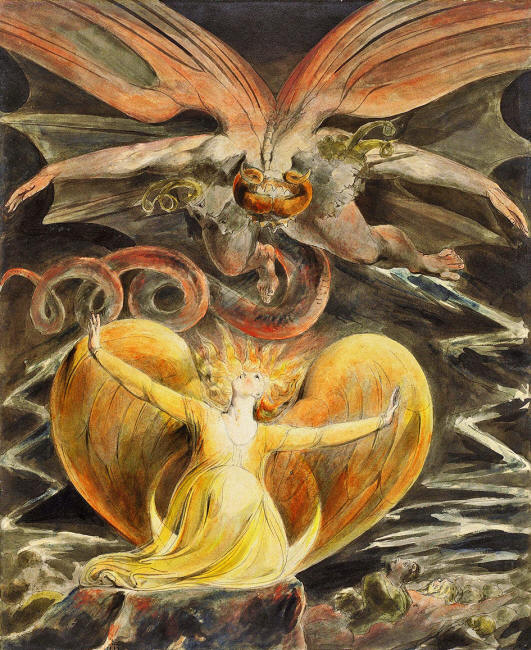
William Blake
The Great Red Dragon
and the Woman Clothed with Sun
(1805)
This mortal coil is a dirty realm, however enchanting.
You never
know who might be a political ally. For anyone trying to stay afloat
on these chaotic seas, now is not the time for purity spirals.
Yet it can't be denied that a dark Beast writhes on the subtle
planes of imagination, just beyond the border of our world. The
first tentacles have already crossed over.
Our fellow men opened the
gates and our reality is being invaded.
I'm no fundamentalist. A fallen world requires a flexible mind and
complicated tactics.
Some souls will embrace the darkness; a few
will escape into the light.
Most of us will cut our own winding
paths out here in the gray twilight.
Despite the obvious advantages, it's hard to see these
screen-spotted tentacles as anything but poisonous.
Spirituality is
a multifaceted jewel - with some sides glowing brighter than
others - but any light coming through the cyborg theocracy is
artificial.
As ever,
you have to know your true enemies and choose your friends
wisely.
If you want my advice, I'd say treat "radical innovation" as an
alien invasion.
Providence will see us through, but until then, try
not to imprint your soul on the screen.
Don't fall in love with a
machine.
Don't let the hate flow through you.
And don't take the iTrode
- unless you're crippled - especially if they try to stick it
where the sun don't shine.
This is not a foolproof plan, of course, but it's good enough for
the Kali Yuga boogaloo...
|







